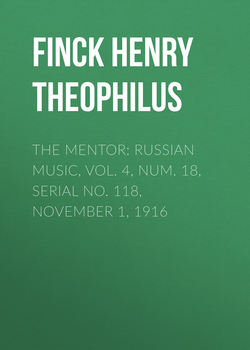Читать книгу The Mentor: Russian Music, Vol. 4, Num. 18, Serial No. 118, November 1, 1916 - Finck Henry Theophilus - Страница 2
RUSSIAN MUSIC
Michal Ivanovich Glinka
ОглавлениеONE
Michal Ivanovich Glinka at an early age showed that he possessed two characteristics that were to have a very important bearing on his whole life – an extremely nervous disposition and a lively aptitude for music. His grandmother, who was responsible for his early upbringing and who was an invalid herself, encouraged the first; while his father stimulated in the boy the second. Glinka, mollycoddled from childhood, never wholly succeeded in throwing off an inherited brooding tendency; but he became a wonderful composer and musician.
Glinka was born on June 2, 1803, at Novospassky, a little village in Russia. His father was a retired army officer and not particularly well off, but his mother’s brother was fairly wealthy, and often when the Glinkas had an entertainment this brother lent them a small private band which he kept up. It was to this early association with music of the best class that young Glinka owed the development of his taste.
He spent his earliest years at home, but when he was thirteen he went to a boarding school in Petrograd, where he remained for five years, carefully studying music. It was in 1822, when he was only seventeen, that he composed his first music – one of his five waltzes for the piano. During these school years he paid attention to the other branches of education also, learning Latin, French, German, English and Persian, and working hard at the study of geography and zoölogy.
Glinka had a nervous breakdown in 1823, and he made a tour of the Caucasus, taking a cure in the waters there. On his return home he worked hard at his music, although as he had not then decided to devote his life to a musical career, his studies were somewhat intermittent. He went to Petrograd and took a position in the government department; but in 1828 his family gave him an allowance and he decided to devote himself to music alone. While at Petrograd he made many friends. However, he saw that a round of pleasure did not aid him in his music, so in 1830 he began his thorough musical education, leaving Russia for Italy, where he stayed for three years studying the works of old and modern Italian masters. His training as a composer was finally finished in Berlin.
Glinka returned to Russia in 1833, and was soon the center of an intellectual circle at Petrograd. It was one of these friends, Joukovsky, the poet, who suggested that Glinka compose an opera on the subject of the heroic patriotic deeds of the Russian hero, Ivan Soussanin. Baron de Rosen wrote the libretto for this work, which was called “A Life for the Czar,” and which was first performed on November 27, 1836.
The plot of this opera was based on the following story: In 1613 the Poles invaded Russia and attempted to assassinate the newly elected Czar, Michael Romanoff. The Polish leaders, however, did not know where to find the Czar. Without letting him know who they were, they asked a peasant, Ivan Soussanin, to guide them to the monarch. Ivan, however, suspecting their designs, sent his adopted son to warn the Czar, and himself led the Poles to the depths of a forest from which they could not possibly find their way. The Poles, when they saw that they had been deceived, killed Soussanin.
This opera was the turning point in Glinka’s life. It was a great success, and in a way became the basis of a Russian school of national music. The opera enjoyed extraordinary popularity. In December, 1879, it reached its 500th performance, and in November, 1886, a special production was given, not only at Petrograd, but in every Russian town that had a theater, in celebration of the 50th anniversary of its first performance. It was presented at two theaters in Moscow at the same time.
Glinka had married in 1835, but misunderstandings arose which finally ended in a separation some time afterward.
His second opera, “Ruslan and Ludmilla,” did not appear until 1842. It did not appeal to the popular taste and was a dismal failure. Glinka thought that it was superior to his first, and he was bitterly disappointed at its failure.
In 1845 he made his first visit to Paris, and later he went to Spain. After two years in that country he returned to Russia, where he spent the winter at his home, and then went to Warsaw, remaining there for three years. In 1852 Glinka started for France, paying another visit to Berlin on the way. When, however, war broke out in the Crimea in 1854, he returned to Petrograd. While there he became interested in church music. In order to study this type of music he went to Berlin in 1856. This was his last journey. Early in January, 1857, the composer Meyerbeer arranged a special concert devoted to Glinka’s works. On leaving the hall the Russian contracted a chill. He died on February 15, 1857. Glinka was buried in Berlin. Three months later, however, his body was taken to its present resting place in Petrograd. A monument was erected to his memory there in 1906.
